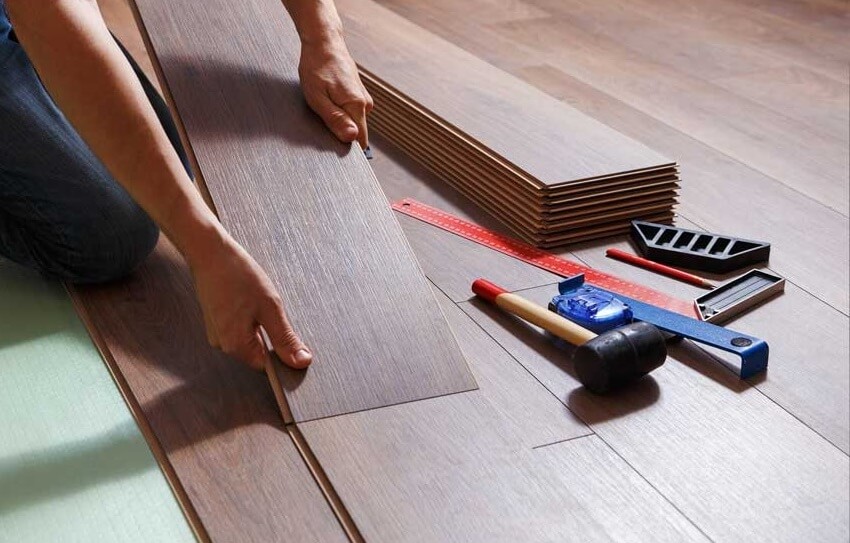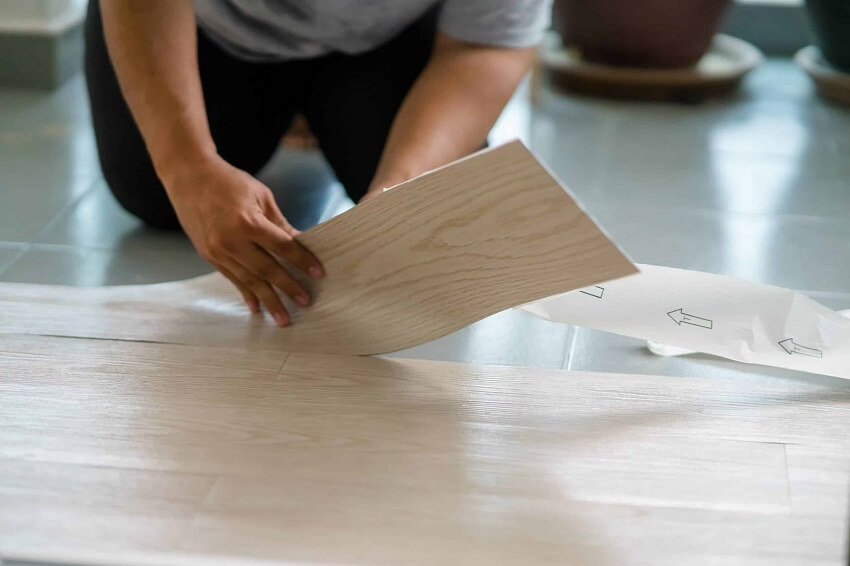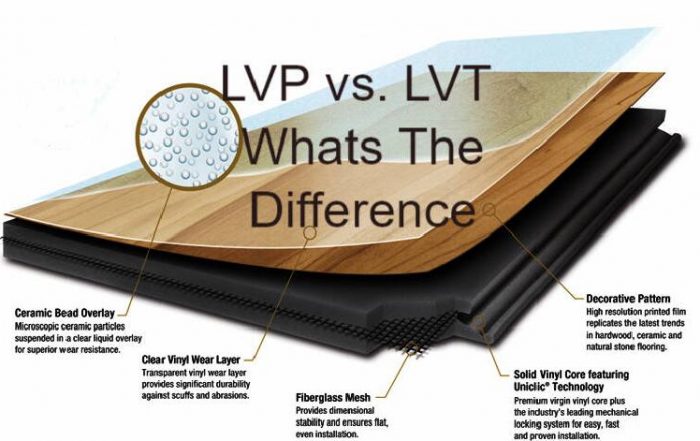You have probably come across the words: LVP flooring or LVT flooring in your day-to-day activities. Did you care to ask what they mean? Well, if not, don’t worry anymore. In this article, I aim at delving into a deep discussion of luxury vinyl plank and luxury vinyl tile flooring.
They are both great options for hardwood flooring but come at a lower cost. They are made of several layers including a wear layer that protects their surfaces from damage. Luxury vinyl tile is made to duplicate the appearance of flooring options like stone and tile. Actually, modern techniques make it hard to distinguish between LVT and actual stone or tile. Nonetheless, it’s cheaper to buy and install than hardwood or stone flooring.
On the other hand, luxury vinyl plank is designed to appear like real hardwood. It offers a great outlook just like hardwood flooring but has the advantage of being cheaper. In addition, it comes in different colors and designs which may not be available in wood flooring.

Pros of LVP Flooring
Cheaper Than Wood Flooring: This is one of the most attractive features of luxury vinyl plank flooring. While it gives the same appearance as wood flooring, it is much cheaper to buy and install LVP. Statistics have shown that LVP costs half as much as hardwood flooring.
Easy to Maintain and Clean: There is not much effort involved when cleaning luxury Vinyl plank flooring. You only have to use a brush to keep off dust and a wet cloth to clean off the dirt from the floor. Furthermore, the floor needs little maintenance due to its durability and water resistance.
Easy to Install: Laying down a wooden floor requires expertise and a lot of precision with no room for mistakes. However, when it comes to installing LVP, fewer skills and tools are needed. You only have to put the planks together while ensuring that they lock in place. In addition, you can simply use a portable chainsaw to trim the planks.
Comes in Various Designs and Colors: Have you ever realized how hard it is to find various designs of wood flooring? However, LVP beats it in this aspect. You have a whole range of colors and patterns to choose from when purchasing LVP. This gives you a perfect flooring option that is flexible enough to match your furniture or walls.
Durable: You definitely know how sensitive wood flooring is to scratches and water which can reduce its lifespan. However, this is no more a problem when you have LVP flooring. It’s much more resistant to scratches made by pets or furniture. Besides, the high water resistance makes it suitable for installation in places that are likely to be waterlogged such as bathrooms and kitchens.
Comfortable: The comfort that comes with vinyl can’t be underestimated. It’s able to maintain room temperature regardless of how cold the environment gets. Therefore, you don’t have to worry about your feet getting cold while walking on it.
Cons of LVP Flooring
Fades in Sunlight: It has been shown that sunlight affects vinyl by a big measure. LVP flooring fades when exposed to much light. This is much more notable in areas near a window where there is direct contact with sunlight. Therefore, you may need to install blinds or curtains to protect the floor from fading.
Can Bring in Health Problems: Vinyl is known to emit pollutant gases referred to as VOCs. The gases have been attributed to various health problems, especially respiratory diseases. Therefore, if you are having a sensitive breathing system, vinyl flooring may not be the best option for you.
Susceptible to Damage by Heavy Things: Since most of the vinyl planks are not glued to the subfloor, they may shift or bend when heavy furniture is dragged on them. Similarly, using a wheelchair on such a floor may damage it too.

Pros of LVT Flooring
Low Cost: You can easily afford to buy LVT flooring. There are two methods for installing LVT. It can be done with the loose-lay floor or with the gluing method. The loose-lay method requires less preparation of the subfloor. This effectively reduces the installation time and cost.
Offers Comfort: LVT has a softer surface compared to other flooring options like stone or wood. Thus, it’s more comfortable when walking on it. Besides, luxury vinyl tile is a good sound absorbent so you don’t have to worry about noises emanating from walking on the floor.
Ease of Maintenance: Natural flooring options like stone flooring are known to have tough maintenance requirements that prevent them from impairment of their look due to damage. You have to regularly sweep or clean the floor combined with constant polishing or waxing to prevent staining. However, LVT has few maintenance requirements. You don’t need to polish or wax the flooring since it has a protective layer.
Affordable: Buying stone or hardwood flooring is expensive. However, LVT offers a durable alternative but at a lower cost. Furthermore, installing LVT requires a few tools and techniques.
Resistant to Water and Wear: The material that is used to manufacture LVT is efficient in guarding the flooring against mishaps. Luxury vinyl tile flooring is resistant to water and thus can be installed in bathrooms, kitchens, and other areas that are prone to waterlogging. In addition, pets like dogs and pets can hardly cause scratches on PVT flooring.
Offers Many Design Options: Several patterns can be engraved on the vinyl tiles to mimic a stone-like or wood-like appearance. Several design options are there to accommodate the varying preferences of flooring customers. Wearing out of the pattern layer should not worry you since it’s protected by the protective film.
Cons of LVT Flooring
Non-biodegradable: One of the major drawbacks of LVT as far as the environment is concerned, is that it’s hard to recycle them. When disposed of, they stay in garbage dens as long as possible. This may lead to accumulation and consequently cause land pollution.
Higher Safety and Health Risks: Accidental water spills are very likely to happen on LVT flooring. This may cause slips and falls when someone steps on the wet floor. Unlike carpet which absorbs moisture, water remains on the surface of the LVT. In addition, carpets are good shock absorbers when compared to LVT thus it may be more injurious to fall on an LVT floor. Harmful gases emitted by the flooring can contribute to respiratory problems.
Its Comfort Level is Less Than That of a Carpet: Though LVT is more comfortable than natural stone or tile flooring, the underfoot comfort level can’t match that of a carpet. Studies have shown carpets effectively reduce muscle fatigue making them more suitable for places where people walk around or stand for long periods. It has also been proved that a carpet reduces three times better than LVT flooring.
LVT Doesn’t Add Value to a House: If you are aiming at adding value to your home, LVT may not be the best option for you. Homebuyers rarely have consideration for luxury vinyl tile flooring. While the floor may look great at a glance, it may not add to the price of your home when home appraisers are assessing it.
Conclusion
LVP and LVT flooring are excellent alternatives to hard flooring options like natural stone and hard flooring. Luxury vinyl plank flooring mimics the appearance of natural wood flooring while luxury vinyl tile flooring can be easily confused with natural stone flooring. They are both affordable and you can easily afford to purchase and install them. Besides, they are easy to maintain.
However, vinyl is non-biodegradable and can cause land pollution since LVP can’t be recycled. The above-outlined pros and cons of LVT and LVP flooring can certainly help you decide which is the best for you.

